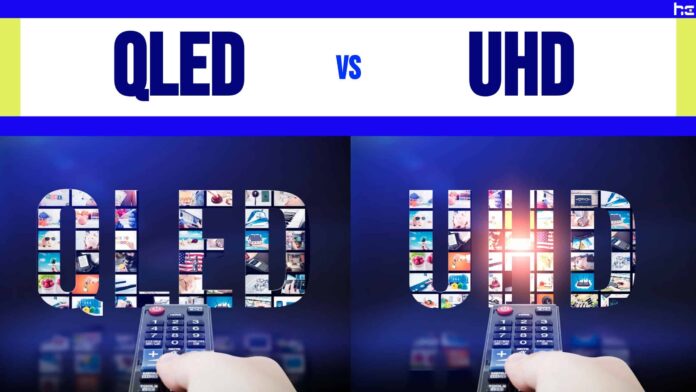Qled vs UHD – Many technical terms and acronyms can be overwhelming when choosing a new TV. Two terms that are often confused are QLED and UHD. This article aims to do comparisons of QLED vs UHD these terms and provide a clear comparison between QLED and UHD TVs.
What is QLED?
QLED stands for Quantum Dot Light-Emitting Diode. It’s a type of LCD TV that uses quantum dots, tiny particles that enhance colour and brightness, to produce a more vibrant and lifelike picture. QLED TVs are known for their exceptional brightness, wide colour gamut, and sharp details.
What is UHD?
UHD stands for Ultra High Definition. It refers to the resolution of a TV screen, specifically 4K resolution, which has 3,840 x 2,160 pixels. This means UHD TVs have four times the number of pixels as Full HD TVs, resulting in a sharper, more detailed picture.
Is QLED Better Than OLED?
Let’s talk about QLED vs UHD. Although the names sound alike, the technology they use is quite different. OLED, which stands for organic light-emitting diode, allows the display to create its own light and colours without needing a backlight, unlike QLED. This makes OLED panels thinner and provides exceptional colour contrast.
OLED can make dark colours or black look truly black by producing very little or no light. In contrast, LED panels still have a faint glow in “black” areas on the screen.
Not All UHD TVs Are QLED, But All QLEDs Are UHD:
QLED TVs are available with 4k resolutions and even higher. While making QLED panels with lower resolutions is technically possible, most manufacturers aim for top-tier quality rather than just introducing new technology. So, it is safe to assume that any QLED TV you come across will probably be in the UHD category. However, a UHD TV can come in various technologies like LED, LCD, OLED, QLED, or even from a projector.
QLED vs UHD: A Side-by-Side Comparison
- Picture Quality: Brightness: QLED TVs excel in brightness, making them ideal for bright environments and HDR content.
- Colour: QLED TVs offer a wider colour gamut, producing more vibrant and accurate colours.
- Contrast: UHD TVs generally have better contrast, especially OLED TVs, which can produce true blacks.
- Resolution: Both QLED and UHD TVs can have 4K resolution, but UHD is a broader term that also includes 8K resolution.
- Price: QLED TVs are typically more expensive than UHD TVs due to their advanced technology.
QLED vs UHD: 11 Key Facts to Know
- QLED TVs are mostly in the UHD category. QLED technology is used in 4k and higher-resolution displays, which makes them qualify as UHD displays.
- UHD stands for ultra high definition and means the display has a resolution of 4k or higher (3,840 x 2,160 pixels).
- QLED and UHD are not competing terms; they are related.
- Not all UHD TVs are QLEDs. Other panel technologies include OLED, LCD, and LED.
- Ultra-high definition sets a standard for image resolution.
- A 4k display has at least eight million active pixels.
- Samsung is the company that developed QLED technology.
- Quantum Dots, which vary in size from two to ten nanometers, are crucial to QLED displays as they produce different colours based on their size.
- The top-tier QLED TVs can reach a peak brightness of 2000 nits.
- Quantum Dots enable QLED TVs to display a wider range of colours compared to their predecessors.
- It is important to note that QLED is still based on LCD technology with an LED backlight.
Which is Better?
The answer depends on your priorities and viewing habits. If you prioritize brightness and vibrant colours, QLED is a great choice. If you prefer deeper blacks and a more cinematic experience, UHD TVs, particularly OLED TVs, are better suited.
Some other comparisons of QLED vs UHD
- Room Lighting: If your room is bright, a QLED TV will handle reflections better.
- Viewing Angle: UHD TVs generally have wider viewing angles, while QLED TVs may experience some colour shifts when viewed from the side.
Conclusion
Both QLED vs UHD TVs offer impressive picture quality, but they have different strengths. QLED excels in brightness and colour, while UHD offers sharper details and better contrast. Ultimately, the best choice depends on your individual preferences and viewing environment.
Some Questions
Which is better, QLED or UHD?
It depends on your priorities. If you want the best picture quality, QLED is the better choice. However, UHD is a good option if you are on a budget.
Do I need a QLED TV if I have a UHD TV?
No, you do not need a QLED TV if you have a UHD TV. UHD TVs still offer great picture quality, and QLED is an additional technology that can further improve the picture quality.
Q: What is the difference between QLED and OLED?
QLED and OLED are display technologies that offer superior picture quality compared to traditional LED displays. However, OLED TVs are generally considered the best on the market, as they offer even better contrast and viewing angles than QLED TVs.
What is the best TV for me?
The best TV for you depends on your needs and preferences. To get the best possible picture quality, then an OLED TV is the best option. However, a UHD TV is a good choice if you are on a budget. If you want a balance of picture quality and price, then a QLED TV is a good option.

















